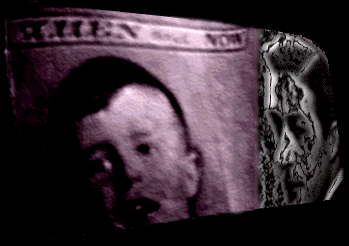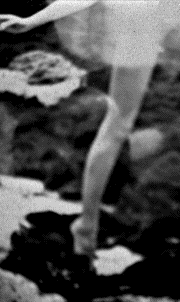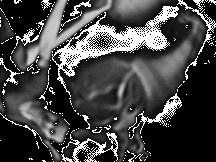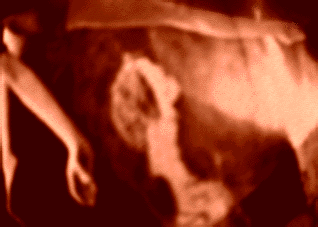
Hand-tinting frees these miniatures of noxious meaning.
Accept some distance so expression can arrive and depart.
- "The Visit", Robert Glück

 |
is named for its opening sequence: a circa-1960 elementary school performance of an allegorical play in which Anyboy and Anygirl are introduced to personified emotions and character traits such as "Lying" and "Generous," and decide which they'd like to take home.
"Pushy" was the sexiest one;
This extended piece of found footage is followed by a careful but not obviously narrative arrangement of elements such as a cinéma vérité treatment of a girls school cafeteria, some amateur porn (one simple display clip, one masturbation clip), color-saturated staged melodrama (including a sickening orgy of color-saturated cake), audio samples from Curse of the Cat People, and clips from found footage of a birthday party (girls are requested to open presents, girls are requested to dance gracefully, girls are requested to sing along with Alan Sherman...).
|
 |

Found footage lets us re-experience childhood in a far truer way than our own family's home movies
Why?since memories of their viewing are more immediate than memories of their making.Artists who specialize in "children's art" value children for their "openness", but the only thing children are especially open to is parroting. Why?It's how they survive. Their assertions of power are shockingly direct; their hypocrisies as shamelessly blatant as the down jackets needed to survive a midwestern winter. Children must make spectacles of themselvesWhy?because children are meant to be seen.Beginning with the elementary school play, Beloff shows how adult manipulation of children trains children to develop the self-manipulation skills which define maturity: the individuality which is the isolating basis of society. Ending with grotesquely mugging responses to Alan Sherman's self-contemptuous calls, Beloff shows that impulses to and expressions of "revolt" are just as strictly determined as polite smiles, dancing, and blowing out candles while making a strictly determined wish: "I don't think I would like to live with Lying." |
All consciousness is founded on an originary self-consciousness. The subject constructs itself first (and last and always) as the object of the imagined gaze. Even the voyeur only truly gets off through consciousness of spying; the fiction of porn is that the barrier between observer and observed can be opened to advance the plot.
"Ready?"
|
 |